March 30, 2011
Egypt: Youth deserves Noble Peace Prize

"I lived with these young revolutionaries in Cairo's Tahrir Square. They are the ones behind the largest successful peaceful revolution in modern history. They were calling - peacefully - for democracy, liberty and social justice. They put their slogan 'Selmia Selmia Peaceful Peaceful' in practice even when they faced brutal force by police killing hundreds of them," said Dr. Mohamed Elmasry, professor of Computer Engineering at Canada's University of Waterloo, who added his voice to a grassroots campaign to nominate the Egyptian people for the 2011 Nobel Peace Prize.
"They collectively deserve the Nobel Peace Prize. I hope they use the award money to establish training centers for all the young Egyptians who cannot find jobs."
Prof. Elmasry added that he sent a letter to the Nobel committee to nominate Egypt's Youth for the 2011 Nobel for Peace.
Meanwhile the following petition is gaining widespread support on the internet:
Egyptian People as 2011 Noble Peace Prize Winner
We, the people around the world who believe in democracy, freedom and the right of every individual to enjoy the pursuit of these, are petitioning the International Tribunal Court, as part of the International Courts which qualify to nominate a Nobel Peace Prize candidate, to nominate the people of Egypt as a viable candidate for 2011.
Dr. Elmasry said he focused on the youth of Egypt because they were instrumental in getting the protests started and putting in place a viable organizational plan to sustain them.
One example was twenty-six-year-old Assmaa Mahfouz. She was instrumental in sparking the protests that began the uprising in Cairo.
http://www.thecanadiancharger.com/page.php?id=5&a=774
Her video blog, posted two weeks before the start of the revolution, was a rallying cry for justice that simply couldn't be ignored.
In the video she said three people had set themselves on fire in Egypt to protest oppression, so if they weren't afraid of death, why should the rest of Egyptians, whom these people sacrificed themselves for, be afraid of Mubarak's security service.
Emphasizing that she is a woman and she had the courage to stand up to the regime, she implored the Egyptian people to join her in a protest on 25 January in Tahrir Square.
A founder of The April 6 Youth Movement - an Egyptian Facebook group started in Spring 2008 to support the workers in El-Mahalla-Kubra - her video blogging and messages on social media, urging people not to be afraid, went viral.
Meanwhile, The April 6 Youth Movement was a major supporter of the protests, distributing 20,000 leaflets saying "I will protest on 25 January to get my rights."
The remarkable overall peacefulness of the protesters, despite great provocations, was credited to the participation of a great many women and children.
Egyptian women were part of the leadership during the revolution. They could be seen in large numbers in Tahrir Square. Like Ms. Mahfouz, other Egyptian women gave media interviews during the revolution, and identified themselves as supporters of the revolution on Facebook, thus showing no fear of reprisals.
Some analysts have attributed Egyptian women's active participation and significant contribution to the revolution to the fact that – especially younger women – are better educated than previous generations.
They represent more than half of Egyptian university students. The advent of social media helped provide them with the tools to become protest leaders.
The Protests in Egypt involved a wide cross section of Egyptian society because they found a deep new resonance among an entire population: freedom, social justice and dignity.
Secular segments of the population became fortified during the revolution as groups as diverse as Youth for Justice and Freedom, Coalition of the Youth of the Revolution, Popular Democratic Movement for Change and the National Association for Change combined to demand their rights.
Many others became involved in support of the protests. Public figures including novelist Allaa Al Aswany, writer Belai Fadi, and actors Amr Waked and Khaled Aboul Naga had announced that they would also participate.
Foreign governments in the West, including the US, regarded Mubarak as an important ally and supporter in the endlessly ongoing Israeli-Palestinian peace negotiations.
In return for his cooperation, Mubarak received $1.3 billion annually in military aid from the US, as well as additional economic development assistance.
But many Egyptian young people felt Mubarak was ignoring them and instead serving the interests of his benefactors in the west. The Egyptian government's cooperation in enforcing the blockade of Gaza was also deeply unpopular among the general population in Egypt.
The Egyptian Revolution, along with the events in Tunisia, have sparked a wave of major uprisings across the Middle East and North Africa, as people who have lived under brutal dictatorships for generations – often propped up by western powers – are now demanding their basic human rights.
The following links contain the petition to award the Egyptian people the Noble Peace Prize:
http://www.petitionspot.com/petitions/tahrir2011
Photo by Dr. Mohamed Elmasry, Cairo’s Tahrir Square, February 1, 2011.








